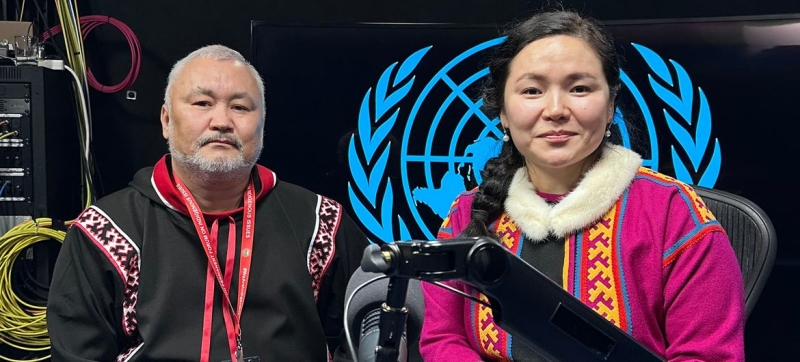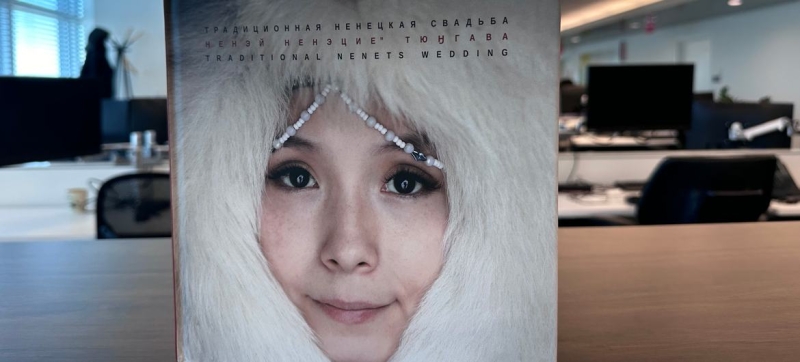
President of the Association of Indigenous Peoples of the North of the Yamal-Nenets Autonomous Okrug Eduard Yaugand and Ekaterina Evay, a native resident of the Russian Yamal. INTERVIEW | Yamal: Nenets youth are increasingly interested in their traditions Culture and education
Ekaterina Evay, an indigenous resident of the Russian Yamal region, a Nenka, and Eduard Yaugand, president of the Association of Indigenous Minorities of the North of the Yamal-Nenets Autonomous Okrug, are delegates to the session of the UN Permanent Forum on Indigenous Issues. In an interview with Nargis Shekinskaya from the UN News Service, they talked about how the indigenous peoples of the Russian North live today, how they adapt to climate change and attract young people to revive the traditions of their ancestors.
NS: Please tell us what you came to this session of the Permanent Forum with?
EE: First of all, I would like to introduce you to the book “Traditional Nenets Wedding”, which reflects the goals of the Permanent Forum on Indigenous Issues and also the Decade for the Preservation of Indigenous Languages. This is a book-album, it contains archival and modern photographs. It talks about our original unique traditions of wedding ceremonies, and also contains information about the Nenets and our way of life. It contains sayings and proverbs related to weddings; this is our intangible heritage. It will help pass on this information, traditional knowledge to our future generations, our children. The book was published in three languages – Russian, English and, of course, Nenets. It was published under the auspices of UNESCO. The authors of the book are photo artist Denis Knyazev, a member of the Russian Geographical Society, and a representative of our most ancient Nenets family, Galina Pavlovna Kharyuchi, a candidate of historical sciences and the author of many books on the life and culture of the Nenets.

Cover of the book “Traditional Nenets wedding”.
NS: What is different about a Nenets wedding? Can you tell us about some of the most striking rituals?
EE:You know, this is a whole series of rituals. Now, thanks in part to this book, among modern youth who do not lead a traditional lifestyle and live in cities, it has again become popular to hold weddings according to traditional German customs. So, in September last year, at the Forum Russia exhibition, which took place in Moscow, our young couple was married according to all the canons. First of all, probably, a traditional wedding is distinguished by the rituals of sacrifice. The obligatory part is matchmaking, ransom, all this characterizes the overall culture and worldview of the Nenets.
NS: You say that young people have become interested in these rituals?
EE: Yes, interest is returning. And you know, if earlier in my childhood we didn’t want to stand out, we wanted to be like everyone else, but now, thanks to the work, including our fathers, to protect and promote our interests, I want to say that I am a Nenk, that my culture is unique . I even felt emotional when I remembered my dad…
AY: I fully support what Ekaterina said. Indeed, the level of self-awareness of the indigenous peoples of the North is increasing. Today we came here to talk about the events that are being implemented in the Yamalo-Nenets Autonomous Okrug, including within the framework of the main topic, that is, supporting youth. We all understand that the future depends on education. Today at the forum I would like to talk about the activities that we are implementing to increase the level of education of Nenets youth in our north, in Yamal. This applies to living in a dormitory, the payment of certain scholarships, the educational process, and in the future, employment.
NS: What about languages? There is interest among young people in mastering indigenous languages?
AY: Yes, of course. Now again the interest has increased. For example, we have communities of those who left Yamal to study in St. Petersburg, they formed a club there to speak their native language and not forget it. And those who do not speak it can learn some basics in this club and join the general language sphere of communication. This is a very significant fact. Tthe most varied topics are discussed – rituals, customs of the Nenets, life in the city or something else. The guys prepare for such meetings and try to increase their vocabulary.
NS: Yes, it is, of course, a very positive trend that young people are showing such interest. In order to preserve culture, it must first be passed on to children. You mentioned that there are a lot of sayings and proverbs related to the wedding ceremony. Can you cite any of them and explain their meaning?
EE: Well, for example, what has to do with the weather. When the bride moves into her husband’s tent, they look at what the weather is like. The morning after the wedding, a woman already feels like a full-fledged housewife in her husband’s tent, and how deftly she manages to start a fire is judged by how easy and cloudless her married life will be.
NS: You mentioned customs related to the weather. The UN very often says that indigenous peoples know how to live in harmony with nature and understand it better. How today your knowledge and skills of your people can help other people adapt to the weather and climate change?
AY:This is an interesting and difficult question. Let me give you an example: in our North, it is not the reindeer herder who leads his herds somewhere, but he himself goes after the reindeer, which have their own special calendar “built-in” inside them. They know when they need to move, say, from winter pastures to summer ones. We see how animals sense climate change. They start moving earlier, crossing the Ob Bay, as we say, “to the women’s side.” They move from one bank of the Ob to the other on the ice: in the fall – to the winter pasture, and then in the spring they return again along the ice to the summer pastures. Reindeer herders see that the reindeer start moving earlier, while they can still cross the river on the ice. I can say that neither our man nor the deer can be separated from nature.
EE: I can add that, for example, we still have a lot of snow, That’s why we don’t really feel climate change yet. When we left, it was -15, a lot of snow had fallen, there was a blizzard. The Arctic remains the Arctic for now.
Read also:
Session of the Permanent Forum on Indigenous Issues opened in New York
NS: But at the same time, scientists are now talking a lot about the thawing of permafrost, and this also applies to the large northern territories of Russia, including those inhabited by indigenous peoples. You feel it somehow?
EE: Now which especially affects everyday life? Mosquitoes appear earlier, gadflies. Summer comes earlier, everything begins to bloom, insects quickly appear, and then it ends just as quickly. Some new species of insects appear that have never existed before. Which, of course, also indicates a change in the direction of warming.
EY: We are conducting scientific research on permafrost in Yamal. How will warming affect our soil? We all understand that this is a strategic territory, here we are developing oil and gas fields and looking at how climate change can affect our objects. Such studies are carried out in Salekhard and in general in the Yamalo-Nenets Autonomous Okrug.
NS: There are already some specifics?
AY: Research began not long ago. We are really looking forward to the results so that in the future we can provide for those measures that will allow us to preserve already built facilities or take into account new circumstances when constructing new facilities.
NS: I’d like to talk a little about the session itself. Have you been able to communicate with representatives of indigenous peoples from other countries? Maybe there are some common problems on which you can exchange experiences?
EE: Salekhard has always been a point of attraction; we have always hosted a lot of events on Arctic topics, including a visiting session of the UN expert mechanism on human rights. It’s very nice to see in the hall today the people who came to us in Yamal. The forum is like a large platform for people who understand each other, who value their culture, their lands, their heritage and who want to pass all this on to their children unchanged and want to protect their rights.
AY: Just yesterday we talked with representatives of the Homo tribe from the United States of America. They spoke about their pain: about oil and gas companies that explore the ocean floor and thereby harm fishermen who traditionally rely on seafood. They talked about the need to establish uniform rules for the use of water areas so that such developments do not disrupt the measured rhythm of life of those people who historically lived in a certain territory, fished there, and so on. I introduced them to our representatives who arrived from Kamchatka today.
Our compatriots showed their American friends what kind of crabs we catch in Kamchatka. They were amazed at the size of these crabs, and we said that it was very tasty, and invited them, of course, to our Russia, so that they could see how indigenous peoples live in Russia and how their rights are taken into account when, for example, the development of certain or other territories, including water ones.
